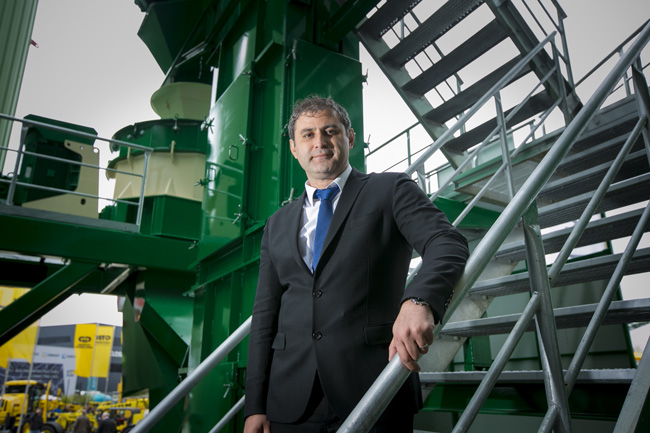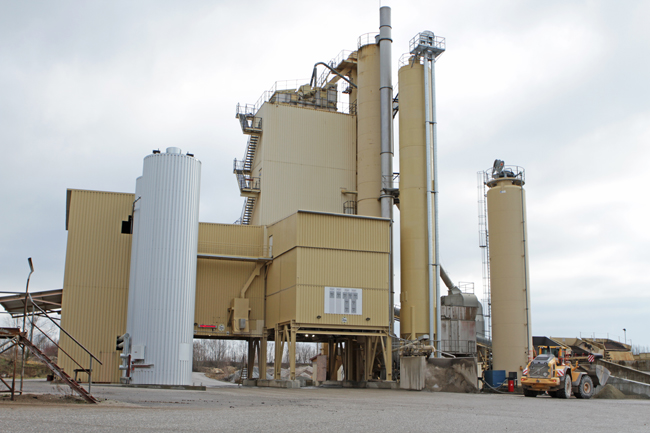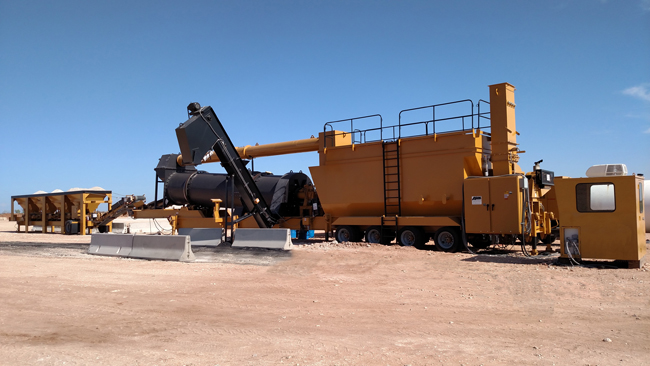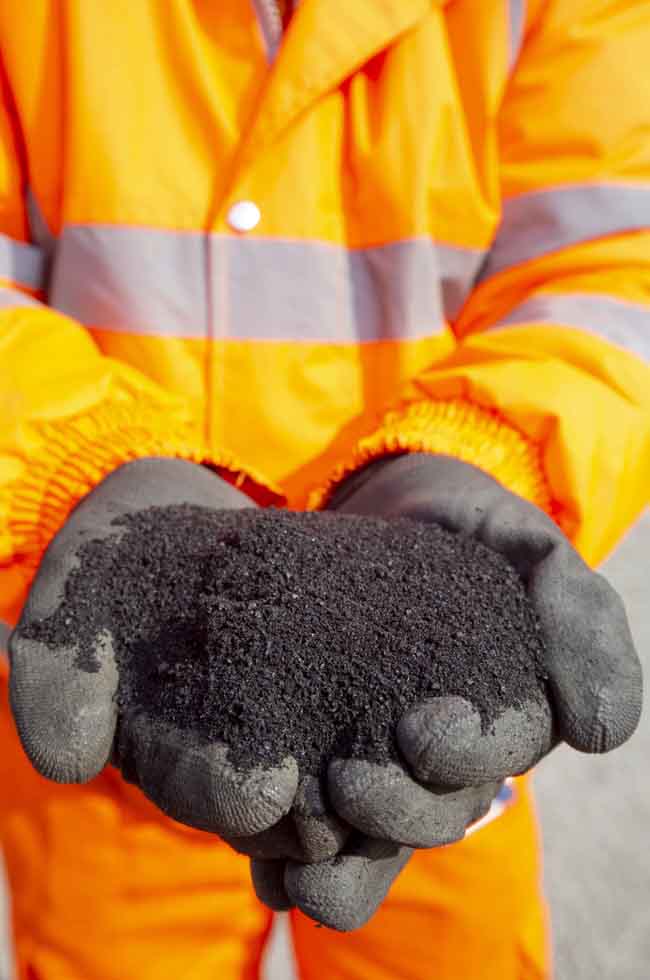
Rising above the showground at
Though E-Mak is a relatively small player in the asphalt plant market, this show of strength demonstrates that it has the financial backing of the much larger
“We have the financial support of a huge company, but we also have the flexibility of a small firm,” says Recepgil. “We are not a huge corporation with long reaction times. We can resolve problems quickly. It’s very easy to reach us.”
Projects like the Megaton demonstrate the fact that E-Mak still retains the entrepreneurial and inventive spirit of its founder and chairman of the Simge Group, Mehmet Nezir Gencer.
Gencer founded E-Mak back in 1992. Initially its role was to provide machinery for the Simge Group companies, the first of which, Simge Construction, started operating in 1977. Later E-Mak began to supply equipment, mainly related to asphalt plants, to others.
Today, E-Mak operates in Europe, Central Asia, North Africa and the Middle East. Currently there is good demand from Baltic countries as well as Kazakhstan and Saudi Arabia, says Recepgil. But markets are changing all the time due to economic and political factors, he adds, which means that companies like E-Mak must be able to manoeuvre and adapt.
Each market must be treated differently, says Recepgil, and that requires local knowledge. Over the past decade or so, E-Mak has been building up a network of local experts who can sell E-Mak products and services in the context of their own markets while providing intelligence and feedback to head office.
In Europe, for instance, E-Mak has recently changed direction to concentrate on retrofitting and renovation. “For the European market there is not a high demand for purchasing the total asphalt plant package,” says Recepgil. “They have a tendency to refurbish, replace, retrofit what they have.”
E-Mak has a dedicated team to deal with upgrades and repairs. “You have to have technical people for these tasks,” explains Recepgil. “Every plant is totally different. We have to check what equipment is there, what its condition is, make measurements and understand how everything works.”
The Megaton, initially reported on in Aggregates Business’s Aggregates Production feature in May-June 19 issues, was designed for quarries or aggregate processing facilities with multiple customers serving multiple sectors. It is the next step on from Simge Group’s Challenger, which crushes and screens aggregate and feeds it directly into an asphalt plant.
Megaton takes quarried rock, crushes it in a vertical shaft impactor, lifts it using a vertical elevator and then puts it through a variety of screening units to produce the grading of aggregate required for a concrete or asphalt mix. The aggregates then go into huge storage silos with a capacity of 3,000 tonnes.
After its time at bauma 2019, the very first Megaton was going to be installed at the quarry of E-Mak sister company Simgemat in Bursa in Turkey. This Megaton will have two screening systems to feed both concrete and asphalt mix production, but different versions and combinations can be made to suit a customer’s requirements, says Recepgil. A Megaton could also be supplying aggregates alone.
Megaton was conceived for use in quarries in or near large conurbations, where cities have spread out to meet industrial areas. One of the big benefits of the system, says E-Mak, is that it vastly reduces dust production.
It also cuts energy consumption since it keeps aggregates dry. This reduces the heat required to produce asphalt because there is less moisture to be driven off initially.
The need for asphalt, concrete and aggregate production facilities to become more like factories will increase as governments around the world raise air quality standards. E-Mak recognises that it may take a while for others to appreciate its good idea. Challenger took nearly 10 years before it was used outside the group but is now popular throughout Turkey with asphalt manufacturers, according to E-Mak.
The next step will be to put Megaton through its paces at the quarry in Bursa. No doubt there will be changes and developments along the way, says Recepgil. “No design stays the same,” he says. “We are always looking to make improvements.”

Meier Company turned to a retrofit from
“Before, we had four load-out silos with an overall capacity of 280 tonnes,” says Michael Stemplinger, technical manager at Meier Company, an asphalt producer located in Rotthalmünster, Bavaria, southern Germany. “Now we have eight different silos with a total capacity of 640 tonnes.”
The additional silos provided more than storage. They also greatly improved the flexibility of the business.
“In the last 20 years, requirements from governments have changed and there is a need to produce more varied hot mixes with different materials and additional types of bitumen,” Stemplinger says. “We mix a lot of small batches. We rarely have large orders, but often many orders for small amounts. Every day we mix 10 to 15 different types of asphalt, and that is why we need high flexibility.”
Working within the existing site’s footprint posed some challenges. They were deftly handled by the highly regarded Ammann retrofit team, which was on-site to help. The decision was made to put a new, separate silo in the mixing tower. This required some engineering but Meier Company and Ammann found solutions together.
“The biggest challenge was that we decided to retrofit the plant while continuing the operation of the business,” continues Stemplinger. “The installation of the new silos was done while still mixing asphalt. During this time, we used a shift operation. We produced asphalt from 6am until 2pm. After 2pm, we started the retrofit work.”
The retrofit has made the plant more profitable. Mix can be produced days in advance because of the improved storage capacity, which leads to fewer interruptions and more efficiency during daily operation. Bulk mix can be prepared and stored. There no longer is a need to shut down the plant when there is a smaller customer in between larger orders.
“We are very satisfied with the retrofit,” says Stemplinger. “The plant is running without any problems. The operators have adjusted and are working with the new plant. We achieved what we wanted.”
No matter which side of the debate producers are on regarding climate change, the fact is that worldwide environmental regulations are here to stay, focusing asphalt plant manufacturers and asphalt producers on the need to meet strict environmental requirements every working day.

US company ADM Asphalt Drum Mixers’ introduction of its environmentally friendly and state-of-the-art EX Series of asphalt plants helps producers globally with just this task, according to Mike Devine, president of ADM Asphalt Drum Mixers.
“Our EX Series of asphalt plants feature high production capacities that range from 120-450 tonnes per hour and are available in portable, skid-mounted and relocatable versions. Most importantly, they allow worldwide producers a quick return on investment (ROI) for more profitable operations while meeting environmental demands and highest quality asphalt standards. Extensive research and development went into the innovative design of the EX Series with its counterflow technology to meet the environmental mandates globally,” Devine stated.
Specially designed for clean operation and the highest quality asphalt production, the EX Series’ innovative, counterflow technology separates the drying and mixing zone and helps shield the hot-mix asphalt from the burner flame to help reduce the production of blue smoke. An optional state-of-the-art blue smoke control system captures residual gases and reintroduces them back to the combustion zone, virtually eliminating blue smoke and hydrocarbon emissions.
Carlos Cardenas, sales engineer, ADM Asphalt Drum Mixers, explains: “Counterflow design is based on the process and movement of the material through the drum in the opposite direction of the heated air flow and combustion gases.”
In addition to allowing the elimination of blue smoke and hydrocarbon emissions, the counterflow technology of these EX Series single-drum asphalt plants is said to provide some of the industry’s longest drying and mixing times, through separate drying and mixing zones, for efficient, consistent, high-volume and highest quality asphalt production with RAP (recycled asphalt pavement) up to 50%.
A new rubberised asphalt made out of recycled old tyres has been launched by UK-based
The major sustainable building materials and construction solutions business is the first in the UK to develop a new asphalt technology capable of recycling end-of-life tyres (ELTs) into roads.
With 40 million ELTs generated in Britain every year, the company has created an innovative asphalt mix using granulated rubber.

Tarmac estimates that it will be possible to recycle and reuse up to 750 ELTs for every kilometre of highway surfaced with the new material, depending on the thickness of the road, which would help to reduce the 120,000 tonnes of rubber waste exported from the UK annually.
The initiative is part of Tarmac’s commitment to the circular economy, with the business recycling 8.7 million tonnes of waste from other industries every year. It also builds on the company’s reuse of ELTs to power its cement kilns and its commitment as a net user of waste.
Brian Kent, technical director at Tarmac, said: “While plastic recycling has attracted media headlines, used tyres remain a significant and overlooked waste stream and our new innovative rubber-modified asphalts offer a more sustainable option for our industry and the environment.”
UK asphalt plant manufacturer Parker Plant has recently installed a satellite mixed-material storage system for Tarmac’s Asphalt2Go operation near the centre of Gateshead, in north-east England.
The facility operates on the principle of providing rapid local access to ‘pre-mixed’ asphalt for immediate use in Gateshead, Newcastle, and the surrounding area. Mixed material from Tarmac’s existing asphalt plants situated outside the Tyneside conurbation is brought to the site in the early morning or late at night to avoid daytime urban road congestion. The system stores mixed material at the correct temperature and its central location provides councils and contractors with instant access to high-quality, ready-made asphalt for use in building, repairing and maintaining local roads, along with projects from driveways and cycle paths to pavements and car parks.
At the opening ceremony of the facility, the then Mayor of Gateshead, Councillor Jill Green said: “We’re delighted that Tarmac has chosen to open up this new facility in the east of Gateshead, providing the council and others with access to heated asphalt quickly and without fuss. This new venture is ideally located to help local businesses access this material which will help meet the daily challenges faced by construction professionals.”
John Riley, Tarmac’s area director for its materials business in the North-East, added: “We are very excited about our new Asphalt2Go site in Gateshead. It underlines our commitment to providing a convenient supply of local material which will help support the local council and other customers to deliver surface repair and construction activity with greater ease.”
There are less than 40 asphalt-producing companies in the UK, operating around 275 plants between them. This is a reduction of nearly 10% in the number of companies but a 3% increase in the number of plants in the last five years.
These companies account for a market of around 26 million tonnes/year, an increase of 13% over the same period, although there has been little movement in the size of the market over the last few years.
The leading five producers -
These are some of the findings of an updated report on the asphalt industry published by leading consultancy
The report also provides new analysis of the bitumen market, the structure of the market shares and volumes by company and by region, a study of plant investment and age analysis, planning activity, industry end-use, a review of highways term maintenance contracts and future industry prospects to 2022.













